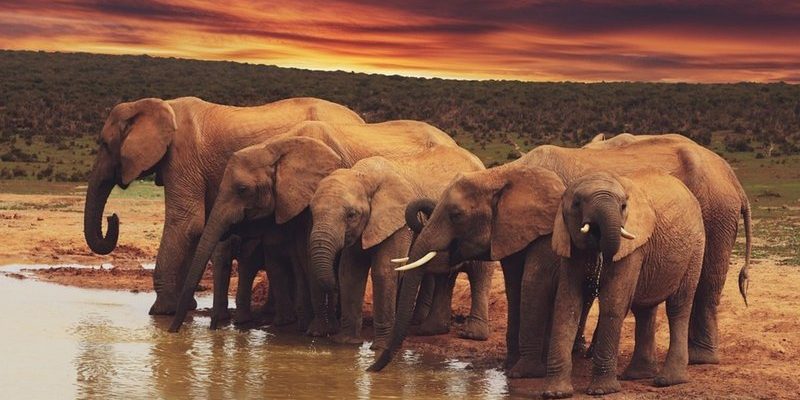
In folklore and mythology, the African elephant often symbolizes strength, wisdom, and family ties. If you’re curious about how these incredible creatures continue to inspire art, stories, and traditions, you’re in the right place. Let’s dive into their representation in various cultures and see just how significant these gentle giants are to human storytelling.
Symbolism of the African Elephant in African Cultures
African elephants often represent various traits depending on the culture. In many African societies, elephants symbolize power and strength. This stems from their size and the way they roam the land confidently. Communities often see elephants as leaders of the animal kingdom, commanding respect from other creatures. Their behaviors, like nurturing their young and living in tight-knit family groups, also emphasize the importance of community and family bonds.
For instance, among the Maasai people, the elephant is admired and respected. They refer to it as “Eunoto,” which conveys honor and reverence. This respect is evident in Maasai art and storytelling, where the elephant often features prominently, embodying the qualities that the Maasai hold dear.
Elephants in African Folklore and Myths
In African folklore, elephants frequently appear as central characters in tales that convey moral lessons. The stories often highlight the elephant’s intellect and social nature. One popular tale involves a clever elephant outsmarting a predator, showcasing both wisdom and courage. Such stories serve not only to entertain but also to teach children about bravery, loyalty, and the importance of clever thinking.
Many cultures also associate elephants with the spiritual realm. For example, in some tribes, they are believed to act as protectors of the land and its people. Rituals and ceremonies often include features inspired by elephants, reinforcing their status as symbols of protection and guardianship.
Art and Literature: Elephants as Cultural Icons
Art offers a vibrant way to see how elephants are celebrated in various cultures. African sculptures, paintings, and textiles often feature these animals, showcasing their importance. Artists use elephants to express themes of strength, freedom, and beauty. You’ll notice intricate designs that capture the elephants’ majestic forms and movements, telling stories that resonate with viewers.
Literature, too, is filled with references to elephants. In many African tales, elephants are portrayed with human-like qualities. They might speak, demonstrate emotions, or take on roles in the community. This anthropomorphism deepens the connection between humans and elephants, encouraging respect and admiration.
Elephants in Modern Culture and Society
These days, the African elephant’s image has transcended folklore and now appears in modern media, from films to advertisements. Movies like “The Elephant Whisperer” celebrate the bond between humans and elephants, showcasing their intelligence and emotional depth. This not only entertains but educates audiences about the need for conservation and respect for wildlife.
Social media has also played a role in amplifying the elephant’s cultural significance. Videos of elephants displaying their unique behaviors quickly go viral, sparking conversations about their importance in ecosystems and urging people to support conservation efforts. This modern representation helps to keep the cultural narratives alive, while also promoting awareness of the challenges these animals face today.
Conservation and Cultural Significance
With today’s environmental challenges, the cultural representation of elephants is more important than ever. Many communities emphasize the role of elephants in tourism, creating a connection between cultural heritage and economic support. Responsible tourism can help fund conservation efforts, ensuring that elephants continue to thrive in their natural habitats.
Moreover, preserving cultural stories about elephants can foster respect for these animals. By sharing tales that highlight their intelligence, emotional depth, and significant roles in ecosystems, we not only celebrate elephants but also engage more people in conservation. The challenge lies in ensuring that these traditions are passed down to future generations, emphasizing the ongoing relationship between people and elephants.
The Role of Elephants in Spiritual Practices
In several African cultures, elephants hold spiritual significance. Many people view them as symbols of wisdom and guidance, often invoking their spirit during rituals and ceremonies. These animals are sometimes called upon for blessings, protection, or even guidance in life decisions. The connection between elephants and spirituality reinforces the idea that these creatures are not just part of the physical world, but also the spiritual realm.
Rituals involving elephants may vary widely across cultures, but they often include offerings or dances that pay homage to these magnificent beings. By recognizing the elephant’s role in spiritual practices, we see how intertwined their presence is with human beliefs and values.
Ultimately, the African elephant stands as a powerful symbol across various cultures. From traditional folklore that speaks of their wisdom and strength to modern representations in art and media, elephants capture the human imagination. They remind us of the importance of family, community, and respecting nature.
As we look to the future, it’s essential to appreciate and protect these magnificent creatures. Their cultural significance goes beyond just stories; it’s about creating a lasting legacy of strength, community, and respect for wildlife. By celebrating the African elephant’s role in culture and folklore, we help ensure that future generations understand and cherish these incredible beings.

